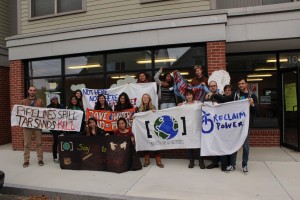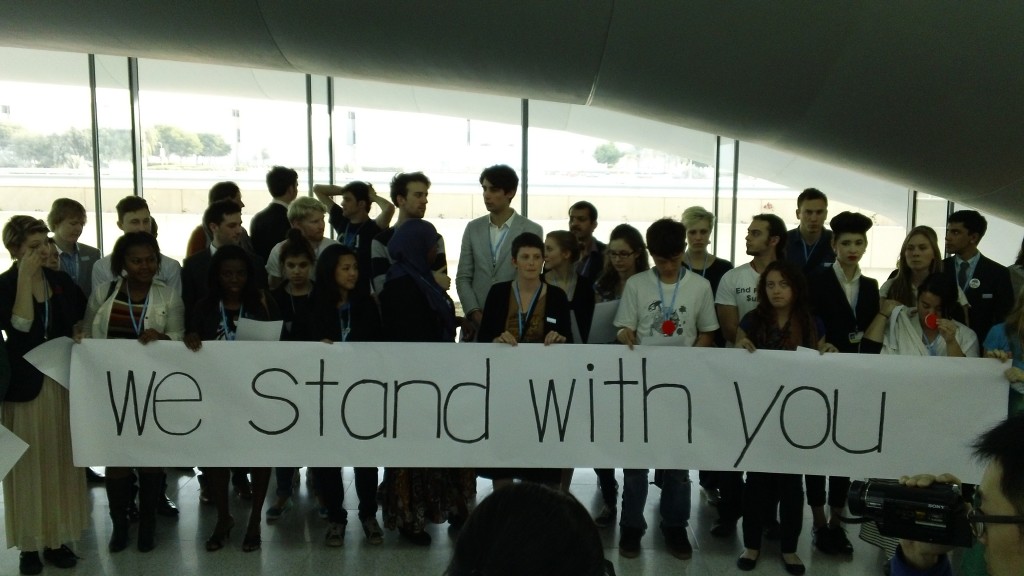by nathan thanki
This past weekend, while a massive group of [Earth]ies made the insane 15 hour journey to Pittsburgh for Powershift 2013, those of us who remained gathered together for Global Frackdown 2. Having recently sent over a dozen volunteers to canvass for Protect South Portland in their effort to block Tar Sands via a waterfront protection ordinance, and with half our group in Pennsylvania, our contribution consisted of hosting a screening of Gasland 2 for the COA community.

Although our writing at Earth in Brackets has been mainly focused on issues of environmental governance at global level (i.e. UN processes), the perils of extreme and unconventional fossil fuel extraction–tar sands, mountaintop removal, fracking for oil and gas, the list goes on–are not unknown to us. But the extent of this assault on the earth and the life it supports is not fully appreciated, even among our own community. Given recent events a few hours north of here in Elsipogtog, where the Canadian police, protecting fracking companies, violently confronted Mi’kmaq protesters, there couldn’t have been a more timely occasion to spread the knowledge about the industry and its tactics. All across the world, that is exactly what was being done on October 19th as part of Global Frackdown and Reclaim Power! Month of Action against Dirty Energy.
Fracking is a hot topic: it was the third most googled word in 2011. The resistance movement building against it is not only massively broad (see the official partner list for Global Frackdown); it is increasingly radical and radicalizing. The images of white, middle aged, middle class residents of Balcombe–UK Tory heartland–being arrested are testament of that.

The “why” is fairly obvious. Fracking cuts across most of the issues that people care about: the harmful chemicals used in the process make it a threat to food production, to water, and to human health. Fracking is also an energy issue, a land rights issue, and a trade issue. Perhaps most disturbingly of all, fracking is increasingly an issue of democracy itself. It’s a perfect storm. Everyone has a stake in the game: you’re either for fracking or you’re against it. If you think you’re neither, you’re for.
The shocking middle of the road stance to fracking adopted by many Big Green groups in the US is perhaps more understandable when you consider the possibility that the Obama administration may say a belated and tepid “no” to the Keystone XL Tar Sands pipeline, in exchange for shale gas support. In spite of that, the majority of environmental activists–nay, the majority of anyone with any sense–has called bullshit. The Obama administration is keen to sell shale gas as a “transition fuel” (from fossil fuel to fossil fuel?) with lesser greenhouse gas emissions than other fossil fuels. In fact, due to methane’s potency as a GHG combined with the high rates of methane leakage at almsot every stage of the fracing process, shale gas is turning out to be the worst fuel we could be extracting. But what would you expect from the proponents of such idiocies as “clean coal?”
All that is, if not besides the point then at least a secondary point, because the bottom line is that shale gas, like all fossil fuel, is causing climate change. Totally unnecessarily, as it turns out, because we can power the world on renewable energy. So why are governments opening the doors to frackers, from Northern Ireland to North Dakota, from South Carolina to South Africa? Why are public funds not pouring into honing renewable technology (I ask this as a massive skeptic of all techno-fixes)? Obviously governments care more about the interests of those who bankroll them than those who vote for them.
If corporate capture of government is rampant, then by extension so is corporate capture of intergovernmental processes, like the UNFCCC. The climate negotiations have always been populated with deniers of every persuasion (see “The Carbon War” by Jermey Leggett), but now it actually has fossil fuel sponsors! We mock the idea of clean coal, and rightly so, but it could be the coal guys who get the last laugh: Christiana Figueras, the Executive Secretary of the UNFCCC, is going to speak at the International Coal and Climate Summit (conveniently held in the same place and at the same time at COP19). So is the Polish Deputy Prime Minister. I want to believe they are going to say that coal has no place in the clean energy future, but I doubt it. They’re going to say welcome to the game.

The dice may be weighted in their favour, but the game is not over. While people are fighting the frackers and their armies (which, when the government is under corporate control, includes the state forces), sometimes literally, at a community level, we need to go on the offensive at the global level. Campaigns like Global Frackdown and Reclaim Power! are all about linking up many distant fights on a common platform. National “Powershifts” are building strong, broad-based coalitions to push for domestic action. But what about the UN fight? It’s quite common among climate activists to scoff knowingly at the mention of the UNFCCC, as if saying it is not the solution somehow makes it not a problem either. We can’t go on like that. That god-awful show will continue, with or without our presence. Trust me, there are enough corporate types and baby bureaucrats to make sure of that. What we need to do, all of us who really care about environmental justice (which is just as much about justice for people as it is about justice for whatever your term for mother earth is), is to storm the castle. We need to take all of this beautiful, creative, hopeful energy and genius that is being used to directly fight the fossil fuel industry in divestment campaigns, blockades, and law suits the world over and inject it forcefully into the UNFCCC doldrums as well. What’s more, we need to do that before the “Copenhagen 2.0” moment in Paris in 2015, when a “new treaty” is expected, though not guaranteed. It’ll be too late by then to do anything apart from witness the collective insanity of our governments as they applaud themselves for enshrining the ‘do nothing’ approach to climate change into international law. Or, perhaps worse, we’ll witness a collapse of the talks, leading to the demise of multilateralism and to decisions about the future of the planet being made at G8 meetings in remote golf courses, while outside the planet burns and the masses begin stirring…
The angry mob may end up storming the metaphorical Bastille come 2015, but our fate will have already been sealed. It is being sealed now, with every successful frack pad and with every mention of clean coal. It is being sealed, slowly but surely, with every passing negotiating session that yields nothing but frustrated and depressing media reports. Remember, the onus is on us to change things. Corporate apologists, UN careerists, and Dirty Energy jackals (some people are all three) don’t need to change anything. The long war suits them, because it is we who are up against the ticking clock.
GASLAND 2 from NestovekPoMedziu on Vimeo.